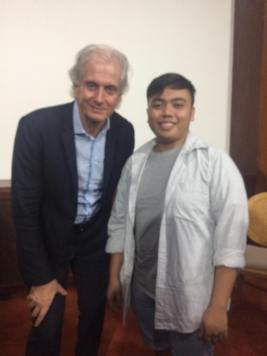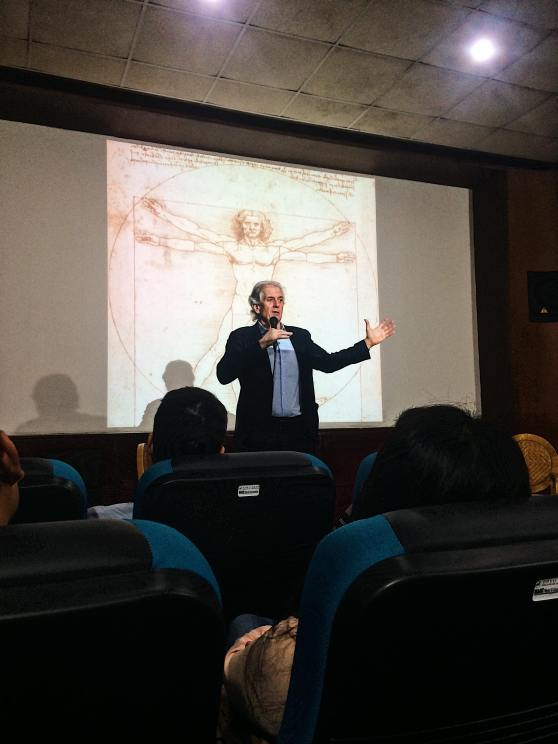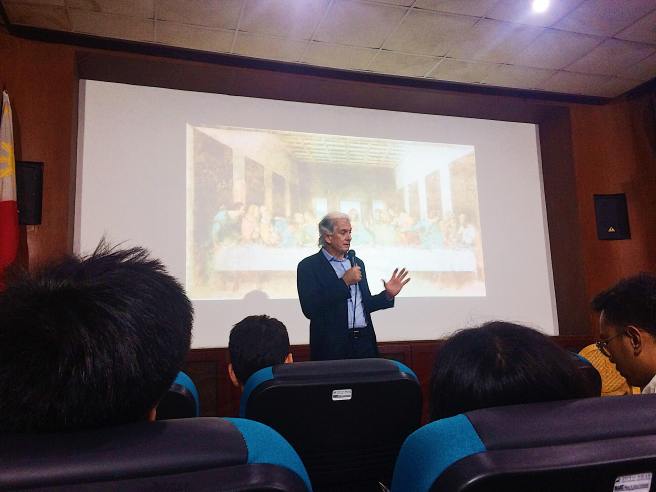In a particular moment in the Manila art scene when nearly everyone suddenly went extra crazy over the works of Dutch painter Vincent Van Gogh, another genius of the humanities worthy of the same attention was celebrated. Renaissance artist Leonard Da Vinci died 500 years ago in France. To mark the death anniversary of the great Italian polymath, several cultural events aimed at commemorating his life were held across the metro, including the exclusive screening of Massimiliano Finazzer Flory’s short film ‘Being Leonardo Da Vinci: An Impossible Interview’. Through an imagined conversation, Flory examined the role of Da Vinci in developing the fundamental principles of painting, theatre, and cinema. The result was a profound discussion every art fan would wish to have.
The movie screening held at Tanghalang Manuel Conde, Cultural Center of the Philippines last 20th November was organised by the Philippine Italian Association, the Embassy of Italy, and the Italian Chamber of Commerce in the Philippines. The viewing of the 24-minute film was immediately followed by a masterclass where Flory, a renowned Italian director who also played the role of Da Vinci, further explained the inspiration of his work and answered several questions from the guests.
Flory’s film makes up for its rather underwhelming cinematography in the excellent exchange of dialogue. It is set in Chateau du Clos Lucé in France where Da Vinci spent his last days serving King Francis. Flory made an interesting vision of connecting the past to the present by organising an interview between Da Vinci and two 21st century reporters, one from New York and the other from Milan.

The words of Da Vinci were unsurprisingly sublime as he explains the qualities of nature and how they inspire the artist and his art. I have been a fan of Da Vinci’s body of work for the longest time, and the adoration only grew when I read a couple of National Geographic articles about his intriguing life. There is no single way to describe the man behind the enigmatic smile of La Gioconda; maybe because he was everything: painter, musician, scenographer, anatomist, philosopher, civil and war engineer, and many other titles that are impossible to have all at once in a lifetime. But in the film when asked about how he wants to be regarded, Da Vinci said he is an inventor.

Da Vinci as an inventor makes a lot of sense if one will take a closer look at his creations. He was a man who not only studied the natural behaviour of the physical world but also formed knowledge that was not there before. He knew there are certain details of life that can only be made clear through experience, hence, ‘truth is the daughter of time’. Flory expounded this idea by talking about how events in Da Vinci’s life, particularly during his childhood, helped him to create a vision that he eventually shared to everyone through art. What is most special about the artist was his decision to never abandon the level of curiosity he had as a child.
As the pretend interview went on, the discussion became more committed to answering the questions around the truest identity of Da Vinci. He remarkably said that he is ‘an interpreter of Man and Nature’. This statement, to which Flory’s master class is anchored, is the reason why I think it takes more than one viewing to fully grasp the intellect of the film. Flory discussed some of the notable works of Da Vinci and the traces of genius embedded in them, perpetuating the notion that he is a maestro of more than one discipline.

According to Flory, Da Vinci’s The Last Supper exhibits a certain distribution of movement and emotion which is essential in understanding the flow of actions in theatre. He observed that the level of distress present in the faces of the apostles is based on their distance from Jesus Christ. The farther the apostle from Christ, the more agitated he appears to be. Flory also claimed Da Vinci had possibly the earliest vision of cinema and the use of drone cameras. Da Vinci invented a flying machine not necessarily for transport (like the goal of the Wright Brothers and Glenn Curtiss), but to gain a fresh angle of nature that is otherwise unachievable given the limitations of man.

Da Vinci’s works will forever be considered a triumph of human creativity. His devotion to the preservation of nature’s beauty is a reminder of how nothing is permanent, and yet there is no memory that art cannot capture.


